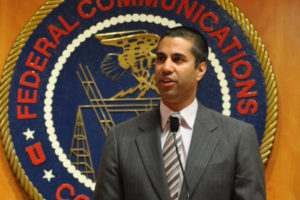 Trump appointed Federal Communications Commission chairman Ajit Pai is rolling back some of his predecessors actions. The new chairman has already begun to make changes to programs that help schools and low income families. Arguing that the the FCC’s Lifeline program is riddled by fraud, waste and abuse he has shut down a small expansion to the program. Lifeline discounts $9.25 per month off broadband or phone services for households near or beneath the poverty line. Pai claimed last year that the program loses around $476 million annually to waste. Others disagree with these numbers. But the statement highlights Pai’s concerns with the program.
Trump appointed Federal Communications Commission chairman Ajit Pai is rolling back some of his predecessors actions. The new chairman has already begun to make changes to programs that help schools and low income families. Arguing that the the FCC’s Lifeline program is riddled by fraud, waste and abuse he has shut down a small expansion to the program. Lifeline discounts $9.25 per month off broadband or phone services for households near or beneath the poverty line. Pai claimed last year that the program loses around $476 million annually to waste. Others disagree with these numbers. But the statement highlights Pai’s concerns with the program.
Broadband service providers have to apply to the commission before offering these subsidies to customers. FCC chairman Tom Wheeler had extended the program to nine more providers. Pai has decided to delay their approval until changes are made to the program. However there is no threat the Lifeline program is being eliminated. Currently there 900 companies participating in the Lifeline program. Most are offering subsidized phone or Internet services and some are offering both.

FCC Chairman Ajit Pai
According to Pai the system needs to be tweaked to prevent companies from enrolling people who are not eligible.
In addition to his rollback of the Lifeline program, the FCC has also withdrew a progress report on the expansion of E-rate. E-Rate is a program that subsidizes broadband and computer equipment for low income school districts. Changes could be coming to this program as well. The commission has not commented on future plans to revisit the Lifeline and E-rate proceedings.
But the question remains whether Pai’s changes will legitimately fight abuse or will the FCC make it harder for legitimate low-income households and school districts to participate.
One of the major problems of the digital age is what has become known as the digital divide. This is the gap between those that can afford high speed acess to the Internet for things like education and those who cannot. This socio-economic group, made up of mostly minority households, maybe left behind in the age of information. Being left out out of the Internet revolution has some serious consequences.
Schools and education suffer because of lack of high speed Internet access. According to a Pew Foundation study 56 percent of teachers in low income schools say that their student’s inadequate access to technology is a ‘major challenge’ for using technology as a teaching aid. Only 18 percent said their students had adequate access at home. Urban teachers are more likely to say students have poor access to Internet at school, while rural teachers are more likely to report that students have poor access at home. This issue creates a class of students who are unabe to fully particiate in a technology based economy.
Today’s workforce requires technology skills but the lack of these skills, practiced at school and home, creates a disadvantage in the search for jobs. The digital divide increases the difficulty of finding a job. This means it lowers not only the chance of finding a suitable job but also the ability to secure a decent income.
Most employers recieve job applications online. But this method creates inequality among job seekers by dividing them into two classes, those who are computer literate, and those who are not. These workers lack knowledge of Internet based information and communication tools. People caught on the wrong side of the digital divide with no access to the Internet lack the technology and digital skills that the modern workplace requires. All these factors create a class of people who are locked in poverty caused by low wages and inadequate education.
A good example is the city of Detroit, MI. This city is stricken by poverty among urban blacks who simply cannot afford computers and Internet access. According to the FCC Detroit has the worst rate of Internet access of any major American city. Four in 10 of its 689,000 residents lack broadband Internet access.
Detroit is not alone. Among the worst cities for Internet connectivity are Cleveand, OH, Memphis, TN, Birmingham, AL and Miami FL. These are the people that federal programs like E-rate and Lifeline is intended to help.
Now you know
